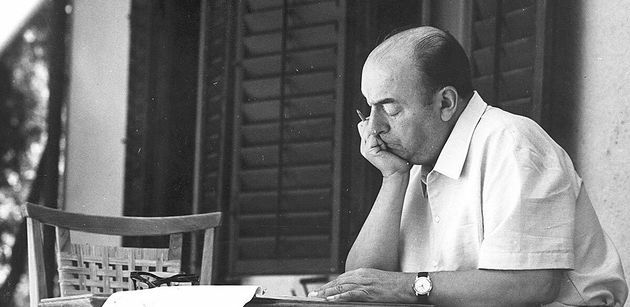Pablo Neruda: his best love poems analyzed and explained
Love is always with us: it affects us, it awakens us, it feeds us, it encourages us, it consumes us from the inside and it consumes us as human beings. It is the universal experience that touches everyone, and that is why it has always been the song of poets. And Pablo Neruda wrote abundantly about love.
Love was a recurring theme in the Chilean writer's poetry, a seduction that the poet did not want to avoid. And why would I avoid it, if the drives that unite souls emerge from it?
It was just a loving book, entitled Twenty love poems and a desperate song, the one that would give Pablo Neruda international notoriety.
The consecration of him thus arrives in the songs to these depths of the soul that make the human experience something transcendent. Not for nothing did he receive the Nobel Prize for Literature.
For this reason, we have prepared a selection of the best love poems by Pablo Neruda, taken from his most important works.

How many times, love, did I love you... (sonnet XXII)
In this poem, love is presented as a deep longing, as a horizon that makes the soul walk in search of some lost spring. Love also seems like a memory, an evocation, a nostalgia. It is the lover of Love who writes:
How many times, love, did I love you without seeing you and maybe without a memory,
without recognizing your look, without looking at you, centaury,
in opposite regions, in a burning noon:
You were just the aroma of the cereals that I love.
Maybe I saw you, I guessed you as I passed by raising a glass
in Angola, in the light of the June moon,
or were you the waist of that guitar
that I played in the darkness and it sounded like the excessive sea.
I loved you without my knowing it, and I looked for your memory.
I entered empty houses with a flashlight to steal your portrait.
But I already knew what it was. Suddenly
while you were going with me I touched you and my life stopped:
in front of my eyes you were, reigning, and queens.
Like a bonfire in the woods, fire is your kingdom.
Taken from the book One hundred sonnets of love.
I do not love you except because I love you (sonnet LXVI)
Love, like the sign, is arbitrary, it has no reasons, it has no arguments. Simply it is and it is left to be. In that to be Y to be love is annoying at times, for the lover is irritated by the perception of being a voluntary captive, a captive without a guard. But that sacrifice is sublime, it is a dense experience, it is the consummation of one's own being.
I don't love you except because I love you
and from loving you to not loving you I arrive
and waiting for you when I don't wait for you
Pass my heart from the cold to the fire.
I love you only because I love you,
I hate you without end, and hating you I beg you,
and the measure of my traveling love
is not seeing you and loving you like a blind man.
Maybe it will consume the January light,
her cruel ray, my whole heart,
stealing the key to calm.
In this story only I die
and I will die of love because I love you,
because I love you, love, with blood and fire.
Taken from the book One hundred sonnets of love.
If ever your chest stops (sonnet XCIII)
The lover who takes the floor has been seduced by the beloved, Matilde, whose life is her own source of energy, her own being.
In this poem, the lyrical voice has succumbed to love with its own name, to love with eyes and body, it has succumbed to the person.
The lover lives outside of himself, for the other and for the other. The kiss stands as a symbol of eternal union, of the fullness of the love experience, of fulfillment.
If ever your chest stops
if something stops burning through your veins,
if your voice in your mouth goes without being a word,
if your hands forget to fly and fall asleep,
Matilde, love, leave your lips parted
because that last kiss must last with me,
must remain immobile forever in your mouth
so that he also accompanies me in my death.
I will die kissing your crazy cold mouth,
embracing the lost cluster of your body,
and looking for the light of your closed eyes.
And so when the earth receives our embrace
we will be confused in a single death
to live forever the eternity of a kiss.
Taken from the book One hundred sonnets of love.
If you forget me
The poet knows: love lives in memory, in living memory. The lover needs to be remembered to live, to be and to love. If he is forgotten, his love will die and he will die. If he is remembered, his love will live as an eternal lamp that lights up the nights.
Want you to know
one thing.
You know how is this:
if I look
the crystal moon, the red branch
of the slow autumn at my window,
if i touch
next to the fire
the impalpable ash
or the wrinkled body of firewood,
everything leads me to you,
as if everything that exists,
aromas, light, metals,
they were small ships that sail
towards the islands of yours that await me.
However,
if little by little you stop loving me
I will stop loving you little by little.
If suddenly
you forget me
do not look for me,
that I will have already forgotten you.
If you consider long and crazy
the wind of flags
what's going on in my life
and you decide
to leave me on the shore
of the heart in which I have roots,
think
that on that day,
at that time
I will raise my arms
and my roots will come out
to look for another land.
But
if every day,
hourly
you feel that you are destined for me
with implacable sweetness.
If every day rises
a flower to your lips to look for me,
oh my love, oh my,
in me all that fire is repeated,
nothing in me is turned off or forgotten,
my love feeds on your love, beloved,
and while you live it will be in your arms
without leaving mine.
Taken from the book The captain's verses
Woman's body, white hills... (poem I)
The poet has a body; lover and beloved have bodies. In this poem, the threads of a young sensuality are woven, of a living love bed that, like a field of earth, is ditched and penetrated, worked and fertilized. It is Eros who speaks in the voice of the poet:
Woman's body, white hills, white thighs,
you resemble the world in your attitude of surrender.
My body of a wild peasant undermines you
and makes the son jump from the bottom of the earth.
I was just like a tunnel. The birds fled from me
and in me the night entered its powerful invasion.
To survive I forged you like a weapon
like an arrow in my bow, like a stone in my sling.
But the hour of revenge falls, and I love you.
Body of skin, moss, greedy and firm milk.
Ah the glasses of the chest! Ah the eyes of absence!
Ah, the pubic roses! Ah your slow and sad voice!
Body of my woman, I will persist in your grace.
My thirst, my endless craving, my indecisive path!
Dark channels where the eternal thirst follows,
and the fatigue continues, and the infinite pain.
Taken from the book Twenty love poems and a desperate song
See also Twenty love poems and a desperate song.
I like it when you shut up... (poem XV)
Now the beloved contemplates. The beloved observes and is fascinated by the beloved. There is his object of veneration, his beloved in silence, at rest, whom the lover admires:
I like you when you shut up because you are absent,
and you hear me from afar, and my voice does not touch you.
It seems that your eyes have flown
and it seems that a kiss closes your mouth.
As all things are filled with my soul
you emerge from things, full of my soul.
Dream butterfly, you look like my soul,
and you look like the word melancholy.
I like you when you are quiet and you are distant.
And you're like complaining, lullaby butterfly.
And you hear me from afar, and my voice does not reach you:
Allow me to hush myself with your silence.
Let me also speak to you with your silence
clear as a lamp, simple as a ring.
You are like the night, silent and constellated.
Your silence is from the stars, so far and simple.
I like you when you are silent because you are absent.
Distant and painful as if you had died.
A word then, a smile is enough.
And I'm glad, glad it's not true.
Taken from the book Twenty love poems and a desperate song
Here you can hear Pablo Neruda reciting his poems with his own voice:
It may interest you: 37 short love poems commented



